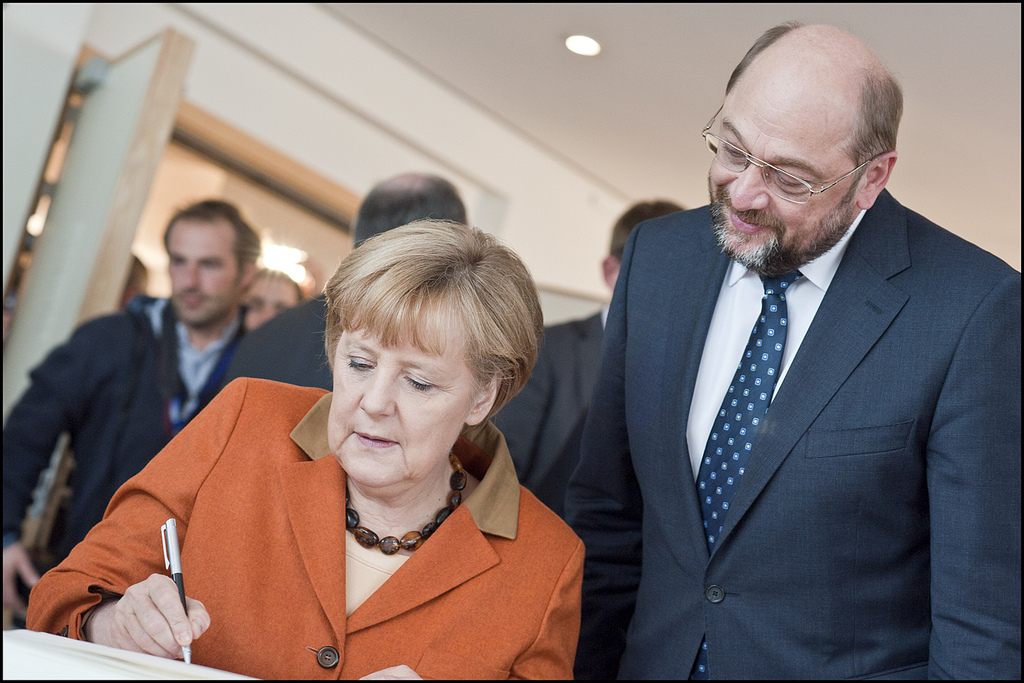
For someone who has dedicated 23 years to making the European Union more relevant to the lives of ordinary Europeans, the fact that only a small number of Germans have ever heard of Martin Schulz may be surprising.
However, as the race for the German chancellorship is heating up, Schulz’ relative obscurity has allowed him to position himself as a fresh-faced outsider free from the entanglements of the Berlin establishment. So far, the polls seem to agree: the Social Democrats have overtaken Merkel’s conservative Christian Democrats for the first time in seven years. This has the Federal Republic’s left dreaming of a new arrangement in Berlin.
They have good reason to be hopeful, for fresh-faced is not an adjective that could be used to describe Angela Merkel. After 12 years in the Chancellor’s seat, the electorate seems to be looking for a change in the status quo as the SPD is surging to highs not seen since the days of Gerhard Schröder.
Under the leadership of Sigmar Gabriel, the SPD had fallen to lows of around 20%, a level that saw the upstart far-right Alternative for Germany (AfD) breathing heavily down their necks. Gabriel’s decision to step aside to make way for Schulz, along with Frank-Walter Steinmeier becoming the next German President, could well be the sign of a new era in German politics, with a resurgent left and a declining conservative center.
Leadership changes have had similar effects on the SPD’s fortunes in the past: the nominations of Peer Steinbrück in 2012 and Steinmeier in 2008 also saw an increase in the party’s popularity of 4% and 3% respectively. In both cases, however, the upsurge was short lived. And while some 56% of Germans surveyed expect the current uptick in the party’s support to be temporary too, there are reasons for the SPD to be more optimistic this time around.
In 2012 and 2008, the party had to contend with an opponent in Angela Merkel who was riding high in the popularity stakes. Today’s Merkel has grown weary from carrying the weight of the world on her shoulders. To drive home the point, the weekly news magazine Der Spiegel recently described Merkel as looking “as though she had been forced into the decision [to run for Chancellor again] at gunpoint”.
Another factor working in the SPD’s favor is the discord between the CDU and its Bavarian branch, the CSU, over Merkel’s unpopular open-door refugee policy. CSU leader Horst Seehofer has openly clashed with Merkel on the issue and called for limits to be imposed on the number of refugees to be admitted entry—a demand that Merkel has flatly refused.
The rebuff was a risky move, since protestant Merkel needs Seehofer to rally support for her in the conservative, Catholic state of Bavaria. Although Seehofer is now officially backing Merkel’s candidacy, he is likely to be a weak pillar in her campaign. Seehofer himself is facing regional elections and seeks to distance himself as far as possible from Merkel’s migrant policy to avoid political costs on his home turf. Hence, there is a real possibility of a split between the two parties that could dent further Merkel’s overall support.
One might assume that the votes lost by the CDU on account of Merkel’s pro-refugee policy would naturally flow to the AfD. Schulz’ candidacy, however, presents a viable alternative for many non-decided and non-voters, who might have opted for the AfD in protest against the status quo in Berlin. If he also manages to reinvigorate the SPD’s traditional working class base, the Social Democrats could sway erstwhile supporters who had switched to the CDU under Merkel’s grand coalition.
While Schulz might try to stay clear of this season’s most contentious subject, the ongoing immigration issue threatens to be as much of a vote loser for Schulz as it will be for Merkel. Indeed, as he is forced to lay out his policies for public scrutiny, it is not only his stance on refugees likely to cause him difficulties with significant swathes of the electorate.
His calls for more leniency towards Greece in dealing with its debt burden will doubtlessly leave him out of step with the German public who largely supports the hardline taken by Merkel in her dealings with Southern Europe. He is also likely to face questions about suspicious payments made to his staff in Brussels, a handy brush for the far-right to paint him as the embodiment of all of Brussels’ ills.
These and other issues are surely going to take some of the varnish off Schulz’s campaign, but barring some major upset, the SPD should be in a strong bargaining position when the post-election coalition negotiations begin. The most comfortable fit for an SPD led government would be a coalition with the Left party and the Greens, but a corollary of the SPD’s rise is that it has come at the expense of support for both of these parties.
The German electorate at large is also disinclined to support such a leftist coalition, so running on a red-red-green platform might disgruntle more centrist voters and drive them into the arms of the AfD. However, should the recent trend continue it could leave as the only option a re-installment of the current CDU/SPD grand coalition, but with the SPD in a strong enough position to demand the Chancellorship for Schulz.
After more than a decade during which the SPD seemed at times to be in terminal decline, Schulz’s election would constitute a remarkable reversal of fortunes and an invigoration of the Left in Germany – so long as Schulz can succeed where his predecessors have failed and cross the finish line with the same momentum with which he has begun the race.